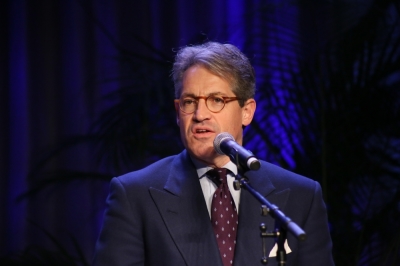Mama Maggie Loves the Little Children: Treasure in the Garbage Slums of Cairo
Next to the Bible itself, perhaps the best source of spiritually nourishing reading material is what many call "the lives of the saints." That is, stories of fellow believers in ages past whose extraordinary lives convict us, inspire us, and draw us closer to Jesus.

Many of you I'm sure have read Augustine's "Confessions." Or maybe Corrie ten Boom's "The Hiding Place." Perhaps you've read Elisabeth Elliot's books about her missionary husband Jim Elliot, who found martyrdom in the Amazon. And dare I add "Bonhoeffer"?
While it's great reading about the lives of the faithful who have gone before us, I find it especially inspiring to read about those who still walk among us.
And inspired is what you'll be if you pick up a copy of a new book released just this week about the woman I had lunch with an hour ago, Maggie Gobran, the so-called "Mother Teresa of Egypt." The book is called "Mama Maggie: The Untold Story of One Woman's Mission to Love the Forgotten Children of Egypt's Garbage Slums."
In this sense, Mama Maggie is very much like Mother Teresa: She has given her life to serve Christ by loving the poorest of the poor. And like Mother Teresa, she has been nominated for the Nobel Peace Prize multiple times, including this year. We'll see what happens.
But there the comparisons should end. Mama Maggie is Egyptian, a Coptic Christian. Married with two children, Mama Maggie was never a nun; in fact, she came from a wealthy Egyptian family, was a very successful businesswoman and university professor, and had a love for fine jewelry, cars, and clothing.
But as detailed in the book, all that changed with a visit with some church friends to one of Cairo's garbage slums. In the midst of unbelievable filth, stench, and depravity—scenes we cannot imagine here in the U.S.—lived thousands of men, women, and children, many of whom are Coptic Christians like Maggie. And Maggie was instantly drawn to them. Especially to the children.
After repeated visits, Maggie reached a decision point. She could remain a professor and continue to enjoy the material fruits of her labor. But, as is told in the book, the thought hit her: "We don't choose where or when to be born. We don't choose where or when to die. But we can choose either to help others or turn away."
"God wanted to promote me," she relates. "He said 'leave the best, the smartest, and go to the poorest of the poor."
And that is what she has done with the determination and savvy of a top-flight businesswoman—and with the profound, tender, and intensely personal love of Jesus. The organization she founded, Stephen's Children, builds schools and vocational centers, runs free medical clinics, houses orphans, and teaches children about Jesus.
In fact, what the authors—my friends Marty Makary and Ellen Vaughn—convey so powerfully in "Mama Maggie" is Maggie's serenity, her deep prayer life, and her trust in God, even when dealing with the brokenness, the child abuse, the disease, the catastrophic injuries she and the staff and volunteers of Stephen's Children encounter every day in the garbage slums.
Folks, this is a remarkable book about a remarkable sister in the Lord. And by the way, if you recognize author Ellen Vaughn's name, it may be because she collaborated on eight books with Chuck Colson.
I urge you, come to BreakPoint.org and click on this commentary. I'll link you to the book and to more information about Mama Maggie and Stephen's Children. And Ellen tells me that the majority of the book's proceeds will go to Stephen's Children—to help Mama Maggie continue her work to bring real hope and help in Jesus' name to the children who live in the garbage slums of Cairo.



























